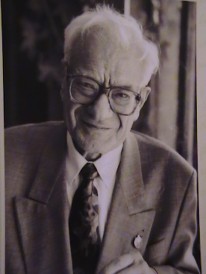
Mavrik Vulfson
The discovery of the authentic copy of the so-called secret protocol of the Molotov-Ribbentrop pact was made by the brilliant Latvian intellectual Mavrik Vulfson in 1988 in the archives in Bonn, with the help of Hans von Herwarth, the German diplomat who had been in Moscow together with Ribbentrop in 1939, and was the only survivor of that historic meeting. Later that same year Vulfson had the sensational courage to present this document to the Presidium and shock the Soviet elite by actually using the word “occupation“. That opened the floodgates to the Baltic freedom movement and disintegration of USSR. Vulfson was later swept aside by the new Latvian elites and the secret protocols were used for other – more ugly political reasons.
Several decades have passed, but Baltic historians and politicians still keep ascribing a huge role to the secret protocol in the subsequent occupation of the Baltic States. To the point where the 23rd of August has become a sort of remembrance day! Meanwhile throughout the decades there has been little or no mention of the Tehran and Yalta conferences and their role in shaping the destiny of the Baltic people. There has been little mention of Churchill’s and Roosevelt’s embarrassing silence at the negotiation table with Stalin in 1945. Neither of the two made any attempt to improve the status of the Baltic States. It can be argued that they had their reasons, but so did the parties of the 1939 non-aggression pact. Let’s just try and be fair here. And it remains true that Stalin’s mass deportations in Latvia were carried out four years after the Yalta conference, in spring 1949, so at least in theory this suffering could have been prevented by the Western Allies. Instead, the attitude of the Allies as they went along with Stalin was rather ambiguous, saying that “it should be kept in mind that the Baltic states had been part of the Russian Empire before 1918” (as Hector McNeil, the Under-Secretary of the Foreign Affairs (1945-1946), summarized in 1947 before the House of Commons).
So in my understanding the point in history where the destiny of the Baltic people was decided is Tehran and Yalta as much as 23rd August 1939, and this “Devil’s Alliance 2” was made without particular secrecy. The dates of Tehran and Yalta should be marked in Baltic history with at least equal importance to that of the Molotov-Ribbentrop pact if we are to denounce the latter. I wonder why Latvians don’t like talking about that?
